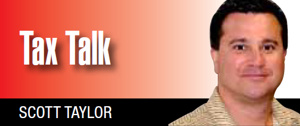While everyone traditionally circles Apr. 30 on their calendar, a more pressing tax deadline is really just days away. If you are a sole proprietor, then Dec. 31 is an important deadline for business decisions. If you are incorporated then whatever your business year-end date is also a critical deadline.
Here are a few tax and accounting items to consider as we approach the end of 2017:
2017 income and expenses
Make sure 2017 income and expenses are reported on your 2017 return.
Businesses use the accrual method of accounting. That means you report income in the fiscal period you earn it, not when you receive it, and you deduct expenses in the fiscal period you incur them, whether you actually paid them in that period or not.
For example, your first broker settlement in 2018 probably will be for a pay period ending Dec. 31, 2017. That income counts toward 2017. Likewise, the cell phone bill dated Dec. 28, 2017, is a 2017 expense even though you’ll pay it just before it’s due in the third week of January.
Make a big purchase
If you’re planning a major purchase, consider doing so before Dec. 31.
There’s an advantage to loading up on deductible expenses in a high-income year. Spending $3,000 on tires in December could save you $900 owed to CRA when you file your 2017 tax return this April. Buying those tires in February 2018 will delay your savings until April 2019.
Make a really big purchase
There’s a rule of thumb in accounting that says the best time to acquire new equipment is at the end of your tax year. It’s generally true as long as you’re financing the vehicle with a loan and not a lease.
That’s because CRA lets you expense a half-year’s depreciation on the asset purchase even though you may have only owned it for a month or two. Since CRA allows a 20% depreciation expense during a truck’s first year, that’s a good chunk of change on a new vehicle. You could be writing off far more than you actually paid out during the short time you’ve had it.
Leasing a new asset close to year-end doesn’t offer the same tax-related benefit. That big initial lease payment is considered to be a pre-paid deposit which you cannot expense all at once. You have to divide it by the number of months in your lease contract and expense that amount each month in addition to your regular lease payment.
People in trucking tend to use the words “buying” and “leasing” interchangeably. If your accountant advises you to buy a new truck, don’t go out and lease one. Purchasing and leasing have totally different effects on your tax planning.
Interest expenses
Any time you pay to borrow money, and that money is used to help you earn business income or provide working capital, the expense is tax-deductible. This includes interest paid on the loan, the cost for the loan to be set up and managed, and any fees for related legal, accounting, and bookkeeping services.
Loan-related expenses aren’t like most business expenses. Interest and other fees may be amortized over the life of the loan and wrapped into monthly payments. Up-front administrative or documentation fees may be buried in the fine print.
Your accountant can clarify precisely which borrowing expenses are business and which are personal. For instance, you might think your tax accounts (including personal tax, corporate tax, payroll source deductions, and GST account) are business-related. But CRA says you cannot deduct the interest charged to these accounts or any loans you may get from financial institutions to pay these amounts. Also, any loans to buy RRSPs or fees charged within your RRSPs are not deductible.
We’re all looking forward to a happy, prosperous 2018. A little last-minute tax planning now can help you end 2017 on the right foot and enter next year a step ahead.
Scott Taylor is vice-president of TFS Group, providing accounting, bookkeeping, tax return preparation, and other business services for owner/operators.
Learn more at www.tfsgroup.com or call 800-461-5970.
